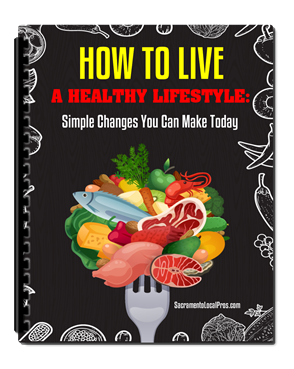High blood pressure, often called the "silent killer," is a condition that can quietly wreak havoc on your health over time if left unchecked.
It increases the risk of serious issues such as heart disease, stroke, and kidney failure, making it crucial to maintain healthy levels.
Thankfully, there are numerous natural strategies you can implement to help control your blood pressure without relying on medication.
Integrating small but impactful changes into your daily routine can lead to significant improvements in your overall well-being while supporting long-term heart health.
Whether it's through mindful eating, regular exercise, or stress management techniques, there are practical solutions available to fit every lifestyle.
Start implementing these natural approaches today for a balanced, healthier lifestyle and improved wellness.
1)) Reduce Sodium Intake
Reducing sodium intake is one of the most effective steps you can take to lower blood pressure naturally.
Sodium causes the body to retain water, which increases the volume of blood in your vessels and subsequently raises blood pressure levels.
By limiting the consumption of high-sodium foods such as processed snacks, canned soups, frozen meals, and fast food, you can significantly improve your heart health.
Instead, focus on preparing fresh, whole foods at home where you can control the amount of salt added to your meals.
Experiment with herbs, spices, and other flavorful seasonings to enhance the taste of your dishes without relying on sodium.
Even small reductions in daily sodium consumption can make a meaningful difference, helping to keep your blood pressure levels in check while supporting better overall health.
2)) Quit Smoking
Quitting smoking is a powerful way to naturally lower your blood pressure and improve your overall health.
Smoking damages blood vessels, causing them to narrow and harden over time, which makes it harder for blood to flow and leads to higher blood pressure.
The nicotine in cigarettes stimulates the body’s stress response, releasing hormones that temporarily spike blood pressure levels with each puff.
By giving up smoking, you allow your blood vessels to begin the healing process, reducing stiffness and improving circulation.
Over time, this can significantly lower your risk of heart disease, stroke, and other serious health concerns.
While quitting can be challenging, using strategies like seeking support from friends and family, joining cessation programs, or replacing the habit with healthier alternatives can make the process more manageable.
The benefits of quitting smoking begin almost immediately and grow increasingly impactful the longer you remain smoke-free.
3)) Limit Alcohol Consumption
Limiting alcohol consumption is a crucial step in managing blood pressure naturally and safeguarding your overall health.
While moderate alcohol intake may have certain benefits for some individuals, excessive drinking can lead to an increase in blood pressure over time.
Alcohol impacts the balance of hormones that regulate blood pressure, causing fluctuations that can strain your heart and blood vessels.
Consuming more than one drink per day for women or two drinks per day for men is associated with heightened risks of hypertension and other cardiovascular issues.
To reduce your alcohol intake, consider setting personal limits, tracking your consumption, and choosing non-alcoholic beverages or water as alternatives during social occasions.
Cutting back on alcohol not only supports healthy blood pressure levels but also contributes to better liver function, improved energy levels, and a stronger immune system, fostering overall wellness.
4)) Cut Back On Caffeine
Cutting back on caffeine can play a key role in naturally lowering blood pressure and maintaining overall heart health.
While caffeine provides a temporary energy boost, it can also temporarily spike blood pressure levels by constricting blood vessels and triggering the release of adrenaline.
Regular heavy caffeine consumption may exacerbate these effects in some individuals, contributing to long-term issues with hypertension.
To reduce your caffeine intake, limit beverages like coffee, energy drinks, and certain teas, and be mindful of hidden sources in foods like chocolate or medications.
Gradually reducing consumption rather than quitting abruptly can help avoid withdrawal symptoms such as fatigue or headaches.
By moderating caffeine intake, you can help promote steadier blood pressure levels and reduce unnecessary strain on your cardiovascular system, supporting a healthier, more balanced lifestyle.
5)) Eat Less Processed Food
Eating less processed food is a vital strategy for naturally managing blood pressure and improving overall health.
Processed foods are often loaded with hidden sodium, unhealthy fats, added sugars, and artificial preservatives, all of which can negatively impact your cardiovascular health and increase the risk of hypertension.
Consuming these foods regularly not only contributes to elevated blood pressure but can also lead to weight gain, a major risk factor for heart disease.
Instead, prioritize fresh, whole, and nutrient-dense foods like fruits, vegetables, lean proteins, and whole grains.
Preparing meals at home allows you to have better control over ingredients and minimize harmful additives.
Reading nutrition labels carefully can help you make more informed choices when purchasing packaged items.
By reducing reliance on processed foods and focusing on wholesome options, you can take meaningful steps toward maintaining healthy blood pressure levels, enhancing energy, and fostering a stronger, healthier body.
6)) Adopt A DASH Diet
Adopting a DASH (Dietary Approaches to Stop Hypertension) diet is an evidence-based method for effectively lowering blood pressure and supporting heart health.
The DASH diet emphasizes the consumption of foods that are rich in essential nutrients such as potassium, magnesium, and calcium while limiting sodium and saturated fats.
This includes incorporating a variety of fruits, vegetables, whole grains, lean proteins, and low-fat dairy products into daily meals.
Reducing sodium intake to fewer than 2,300 milligrams per day—or even 1,500 milligrams for greater benefit—is a key principle of the DASH approach.
This diet not only helps in managing blood pressure but also contributes to overall wellness by promoting weight loss, reducing cholesterol levels, and lowering the risk of chronic diseases such as diabetes and stroke.
Transitioning to this heart-healthy dietary pattern can be made more manageable by planning balanced meals, experimenting with flavorful seasonings like herbs and spices instead of salt, and gradually replacing processed or high-fat foods with wholesome alternatives.
Over time, adopting the DASH diet can lead to significant improvements in cardiovascular health and a higher quality of life.
Pro-Tip: Investing in DASH Diet cookbooks can be a game-changer for anyone managing high blood pressure.
These cookbooks provide a wealth of easy-to-follow, heart-healthy recipes tailored to meet the dietary guidelines of the DASH plan.
They simplify meal planning by offering nutrient-rich meal ideas that are low in sodium and packed with essential minerals like potassium and magnesium.
Furthermore, many DASH cookbooks include practical tips for grocery shopping, food preparation, and recipe substitutions to help you stay on track with your health goals.
By including these resources in your routine, you can make transitioning to and maintaining the DASH diet more enjoyable and sustainable.
Take the first step toward better heart health—explore highly-rated DASH Diet cookbooks today and start transforming your meals and your life!
7)) Increase Potassium Intake
Increasing potassium intake is a powerful way to naturally regulate blood pressure and enhance cardiovascular health.
Potassium helps balance the effects of sodium in the body by promoting sodium excretion through urine, which can significantly reduce blood pressure levels.
It also relaxes blood vessel walls, aiding in improved circulation and overall heart function.
To boost your potassium intake, focus on adding potassium-rich foods into your diet, such as bananas, oranges, spinach, sweet potatoes, avocados, and beans.
These nutrient-dense options not only provide potassium but also offer a wealth of vitamins, minerals, and antioxidants crucial for maintaining overall health.
It's important to strike a balance and monitor your potassium levels, particularly if you have kidney issues or are taking medications that affect electrolyte levels.
By prioritizing potassium in your daily meals and snacks, you can support a healthier heart, promote fluid balance, and take proactive steps toward managing your blood pressure effectively.
8)) Increase Magnesium Intake
Increasing magnesium intake is a vital step in naturally managing blood pressure and improving overall heart health.
Magnesium plays an essential role in relaxing blood vessels, maintaining a healthy heartbeat, and regulating muscle and nerve functions, all of which contribute to stabilized blood pressure levels.
This crucial mineral aids in balancing electrolytes, reducing inflammation, and enhancing insulin sensitivity, which collectively support cardiovascular well-being.
Foods rich in magnesium include leafy greens like spinach and kale, nuts and seeds such as almonds and pumpkin seeds, whole grains, legumes, and fatty fish like salmon.
Adding these nutrient-dense options into your diet ensures you benefit from magnesium's wide array of health-promoting properties.
It's important to note that while most people can meet their magnesium needs through diet, those with a deficiency or certain health conditions may require a supplement under a healthcare professional's guidance.
By prioritizing magnesium-rich foods and maintaining balanced nutrition, you can protect your heart, effectively manage blood pressure, and foster overall health and vitality.
9)) Lose Excess Weight
Losing excess weight is one of the most effective strategies for managing blood pressure and improving overall health.
Carrying extra weight puts added pressure on your heart and blood vessels, increasing the likelihood of developing hypertension and other cardiovascular complications.
Shedding even a modest amount of weight—such as 5-10% of your body weight—can lead to significant improvements in blood pressure levels and reduce the risk of related diseases.
Achieving and maintaining a healthy weight involves adopting sustainable lifestyle changes, such as increasing physical activity, consuming a balanced diet rich in whole foods, and maintaining portion control.
Incorporating regular exercise, whether it’s brisk walking out in nature or on a treadmill, swimming, or resistance training, not only helps you burn calories but also strengthens your heart and enhances circulation.
Focusing on nutrient-dense meals that include plenty of fruits, vegetables, lean proteins, and whole grains can provide essential nutrients while keeping calorie intake in check.
By committing to these healthier habits, you can achieve long-term weight loss, improve cardiovascular health, and boost your overall quality of life.
10)) Exercise Regularly
Engaging in regular exercise is a crucial component of maintaining healthy blood pressure and ensuring overall heart health.
Physical activity strengthens the heart muscle, enabling it to pump blood more efficiently, which in turn lowers the pressure on arteries.
It also helps regulate body weight, improves insulin sensitivity, and reduces stress levels—factors that collectively contribute to better cardiovascular health.
Adding a combination of aerobic exercises, such as walking, jogging, cycling, or swimming, and strength training at the local gym or on a home gym system. can maximize health benefits.
Shoot for at least 150 minutes of moderate-intensity aerobic activity per week, spread across multiple days for consistency.
Beyond structured workouts, finding ways to stay active throughout the day, such as taking the stairs or enjoying an after-dinner walk, can make a big difference.
Exercise has profound effects not just on blood pressure but also on mood, energy levels, and overall well-being.
Committing to a regular exercise routine can lead to long-term health improvements and a stronger, more resilient heart.
11)) Manage Stress
Managing stress is a key factor in maintaining healthy blood pressure and supporting overall well-being.
Chronic stress triggers the release of hormones like cortisol and adrenaline, which can cause temporary spikes in blood pressure and, over time, contribute to long-term cardiovascular issues.
Finding effective ways to reduce and cope with stress can help break this cycle and protect your heart health.
Integrating relaxation techniques such as deep breathing exercises, meditation, or yoga can help calm your mind and lower stress levels.
Regular physical activity also plays a dual role in both reducing stress and improving heart health.
Setting aside time for hobbies, spending time with loved ones, and getting adequate sleep are all essential components of stress management.
Identifying and addressing the root causes of stress, such as work pressures or personal challenges, and seeking professional support when needed can further aid in reducing its impact on your health.
By actively managing stress, you can create a positive ripple effect on your blood pressure, mental health, and overall quality of life.
12)) Get Quality Sleep
Getting quality sleep is essential for maintaining healthy blood pressure and promoting overall well-being.
Poor sleep, whether due to insomnia, sleep apnea, or irregular sleep patterns, can disrupt the body’s natural regulation of stress and hormone levels, leading to an increased risk of hypertension and other cardiovascular issues.
During deep sleep, the body undergoes critical restorative processes, including stabilizing blood pressure and heart rate.
Adults should aim for 7-9 hours of uninterrupted sleep each night to allow these processes to occur.
Establishing a consistent sleep schedule by going to bed and waking up at the same time each day helps regulate your internal body clock.
Creating a relaxing bedtime routine—such as limiting screen time, practicing mindfulness, or reading—can signal your body to prepare for rest.
It's also important to maintain a sleep-friendly environment by keeping your bedroom quiet, dark, and cool.
Addressing any underlying sleep disorders, like sleep apnea, with the guidance of a healthcare professional is crucial for achieving quality rest.
By prioritizing sleep, you can enhance your blood pressure control, boost energy levels, and support a healthier, more balanced lifestyle.
13)) Practice Deep Breathing
Practicing deep breathing is an effective way to reduce stress, lower blood pressure, and promote a sense of calm.
Deep breathing exercises increase oxygen intake and activate the parasympathetic nervous system, which helps slow the heart rate and relax blood vessels.
This physiological response counteracts stress-induced increases in blood pressure and fosters a state of balance within the body.
A simple yet powerful technique involves inhaling deeply through the nose for a count of four, holding the breath for a count of seven, and exhaling slowly through the mouth for a count of eight.
Repeating this cycle several times can quickly bring about a sense of relaxation.
Integrating regular deep breathing sessions into your daily routine, even for just a few minutes, can have lasting effects on both mental and physical health.
Over time, it can improve mindfulness, enhance emotional resilience, and support healthier cardiovascular function.
By dedicating time to this practice, you are investing in a simple but impactful tool that benefits overall well-being in profound ways.
Conclusion
Maintaining healthy blood pressure is a vital aspect of supporting long-term health and preventing serious cardiovascular complications.
By focusing on key lifestyle changes, such as exercising regularly, managing stress effectively, getting restorative sleep, and practicing mindful habits like deep breathing, you can significantly enhance heart health and overall well-being.
These strategies not only help regulate blood pressure but also contribute to better energy levels, mental clarity, and emotional resilience.
It's important to approach these changes with consistency and patience, as small, steady adjustments can lead to meaningful progress over time.
Prioritizing your health by implementing these practices is an investment in your future, ensuring a stronger heart, a healthier body, and an improved quality of life for years to come.
Download Our Free E-book!








